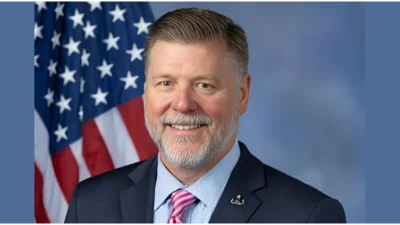Today, Representative Celeste Maloy (UT-02) and Congresswoman Lori Chavez-DeRemer (OR-05) introduced the Full Responsibility and Expedited Enforcement (FREE) Act to streamline the federal permitting process by instituting a ‘permit-by-rule’ (PBR) system.
Joining Rep. Maloy and Rep. Chavez-DeRemer as original cosponsors are House Budget Committee Chair Jodey Arrington (TX-19), Rep. Dan Newhouse (WA-04), Rep. Pete Stauber (MN-08), Rep. Mary Peltola (AK-At-Large), Rep. Jake LaTurner (KS-02), Rep. August Pfluger (TX-11), Rep. Vince Fong (CA-20), Rep. John Curtis (UT-03), Rep. Paul Gosar (AZ-09), Rep. Blake Moore (UT-01), Rep. Michelle Fischbach (MN-07), and Rep. Ryan Zinke (MT-01).
“A large portion of my career has been spent helping Utahns work through burdensome federal permitting processes,” said Rep. Maloy. “Permit applications are often inconsistent and lack clear timelines. The FREE Act offers some long overdue relief, streamlining permits to make them more manageable and predictable. Utah businesses and local governments will benefit from this improvement.”
The FREE Act directs federal agencies to evaluate their permits and report to Congress within 240 days with an assessment of whether permit-by-rule can replace their current systems or make a thorough justification why not. Agencies must then adopt PBR within 12 months for the eligible permits. Under permit-by-rule, agencies must grant all permit applications that meet objective permit standards within 30 days. Agencies can still deny applicants that do not meet requirements and may verify compliance.
“The permitting process is often burdensome and costly, resulting in project delays that hinder economic growth and development. I’m proud to join Congresswoman Maloy to introduce the FREE Act, which would cut through unnecessary red tape by implementing a streamlined permitting process. This is a commonsense proposal that would provide predictability to businesses and speed up domestic projects, helping reduce our reliance on adversarial countries like China,” Rep. Chavez-DeRemer said.
“Reforms to modernize permitting are urgently needed if we’re to fully unlock America’s energy and resource potential,” said Western Caucus Chairman Newhouse. “By implementing ‘permit by rule,’ the cumbersome permitting process will become more efficient by reducing time spent on routine permits and freeing up agency staff to work on larger projects. I applaud Western Caucus Vice Chair Maloy on introducing this important legislation to modernize the permitting process to avoid unnecessary bureaucratic delays to important projects across rural America.”
“Living in Alaska all my life, and meeting with Alaskans about stalled projects every week, it's clear that we need a change to our federal permitting process—one that will cut government red tape for good. Our FREE act’s permit-by-rule system will create jobs, boost Alaskan projects, and expedite disaster relief, said Rep. Peltola.
“The laborious and time-consuming federal permitting process prohibits Utahns from quickly receiving approvals for their projects. It creates frustrating delays and uncertainty, often resulting in canceled projects. The FREE Act is a significant step toward reforming and streamlining our federal permitting system so businesses can receive efficient approvals for their critical projects. The simplified approach outlined in the FREE Act will foster economic growth, encourage innovation, and provide clarity for those seeking federal permits. I thank Congresswoman Maloy for her work to become a leader on reforming our broken permitting system, and I am glad to support this bill, said Rep. Moore.”
“Our energy future will be affordable, reliable, and clean,” said Rep. Curtis. “To make that happen, we need to remove the red tape that holds back our energy projects. I am pleased to support this legislation and work to streamline the permitting process.”
"Over several decades, the federal government has exponentially grown, making the federal permitting process needlessly burdensome without providing optimal benefits to the American people,” said David Bernhardt, 53rd Secretary of the Interior. “Representatives Maloy and Chavez-DeRemer’s permit-by-rule proposal creates a process for federal agencies to start delivering better results and outcomes to the American people. I commend them and each of their co-sponsors for initiating this important effort that could benefit every citizen. Thank you.”
“Federal permitting is often a roadblock to even the most basic work that livestock producers need to do their jobs, as even routine permits face costly delays and overcomplicated processes. Solving this issue takes creativity and a willingness to dig into comprehensive reforms, and the FREE Act will go a long way in reducing duplicative work. We thank Rep. Maloy for recognizing the need to address this problem and working to fix the roadblocks that prevent livestock producers and grazing permittees from doing even the most basic work as part of their daily operations,” said Kaitlynn Glover, Executive Director of the Public Lands Council and Government Affairs for National Cattlemen’s Beef Association.
“Congresswoman Maloy’s permit-by-rule proposal would bring the government’s out-of-date permitting approval process into the 21st century. This efficient approach has already been adopted and practiced in nearly 40 states. Modernizing this critical practice across the federal government is a step in the right direction and would make it easier for small businesses to create more jobs,” said James Sherk, Ph.D., Director of the Center for American Freedom at America First Policy Institute.
“The federal government’s byzantine and burdensome permitting processes are a major obstacle to responsibly developing Utah’s vast mineral wealth and reducing dependence on hostile foreign nations for minerals critical to our economic and national security. Congresswoman Maloy’s FREE Act would greatly reduce mine permitting timelines to bring the U.S. in line with other advanced mining jurisdictions like Canada and Australia. The FREE Act would also provide predictability to the mining industry so it can continue to attract investment and bring sorely needed mining projects online. We appreciate Congresswoman Maloy’s leadership in bringing this innovative and important legislation forward,” said Brian Somers, President of the Utah Mining Association.
“Thank you to Rep. Celeste Maloy (R-UT) for championing the introduction of the Full Responsibility and Expedited Enforcement (FREE) Act. This legislation provides substantive reforms to the federal permitting process. The requirement to obtain federal permits frequently extends to projects such as routine vegetation management, wildfire mitigation work, distribution and transmission line maintenance, and siting new electrical infrastructure projects. The current federal permitting process is full of uncertainty, inefficiencies, and arbitrariness. The FREE Act establishes a permit by rule application process which addresses each of the current deficiencies by delineating substantive application standards, simplifying the application process, and replacing arbitrary decision-making with predictable deadlines. The FREE Act will provide a process by which electric cooperatives may continue providing affordable and reliable electricity to their consumer-members while building the needed infrastructure for generations to come,” said Nathaniel Johnson, Executive Director of the Utah Rural Electric Cooperative Association.
“The current federal permitting process is unfair, time-consuming, and expensive. As a result, businesses, individuals, and the economy suffer," said Tarren Bragdon, CEO of the Opportunity Solutions Project. "We applaud Rep. Maloy for proposing a new permitting process that limits bureaucratic delays and fosters innovation and economic growth. The FREE Act is what a 21st-century permitting process looks like."
"Permit by rule would limit the ability of administrative agencies to use their regulatory authorities inappropriately, which today are being wielded to stop economic growth and land-use activities for the purpose of accomplishing a political agenda. Government was not meant to be weaponized against the people, as is too often the case today. Permit by rule would help reign in the administrative state and importantly, protect American’s property rights,” said Margaret Byfield, Executive Director of American Stewards of Liberty.









